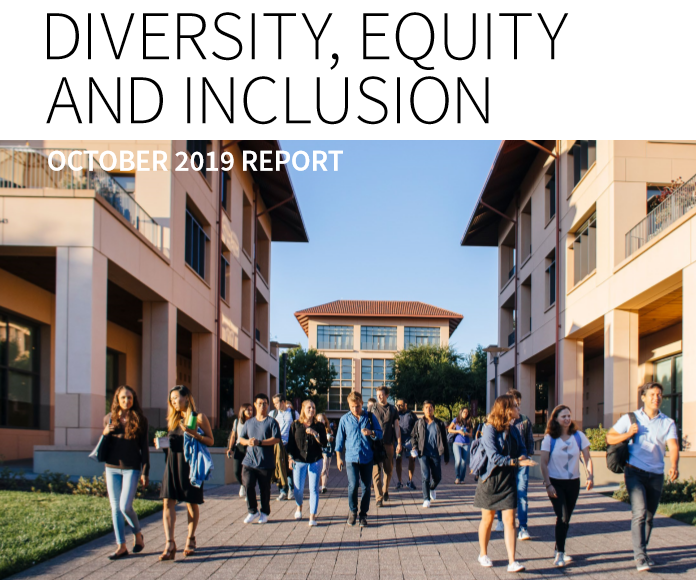Learn how to completely transform how women are described!
As so often happens, I found Sarah Soule as I wandered around the internet looking for women doing amazing work trying to dismantle the stereotypes that shackle women and keep them from rising. Dr. Soule co-authored an outstanding article in the June 2019 Harvard Business Review, “The Stereotypes in MBA Case Studies,” in which she describes her research on case studies and gender stereotyping within Stanford University’s MBA program. In the study, Sarah and her co-authors examined 249 case studies used in Stanford’s MBA core curriculum from 2015-2017 and found similar trends as Symons and Ibarrain in their 2014 research, “What the Scarcity of Women in Business Case Studies Really Looks Like.” The common thread? Continual reinforcement of outdated (false) gender stereotypes. So much to learn here. Don’t miss this!

When Sarah and her research colleagues, Davina Drabkin and Lori Mackenzie, examined the gender stereotypes in the case studies used by Stanford University in its MBA program, they realized that certain words, and the associated images of stereotypes projected by those words, portrayed women in highly judgmental and negative ways instead of seeing them as business leaders, innovators, and creative movers and shakers.
What was most troubling, though, to these female researchers was that the gender stereotyping was endemic in the materials used in teaching the next generation of business leaders. The researchers had fundamental problems with the portrayals of what women do, what men do, and how each go about doing it. Moreover, not only were the women in the case studies typically in “pink” industries, they were usually the only women in the stories and rarely described as positively as their male counterparts. Obviously, something has to change.
How can we change the next generation of leaders if we continue to portray women in stereotypical ways?
We were thrilled when Dr. Soule agreed to an On The Brink podcast interview because we wanted her to share with our listeners what she is doing, learning and teaching others about how the words we use and the images we create deeply influence our ideas about men and women, and not always to the benefit of women. We were not disappointed.
The three major themes Sarah and I discuss:
- Sarah and her colleagues’ research on gender stereotyping in the Stanford MBA case studies, and how Stanford is now addressing the issue and changing (or not changing)
those studies. - Sarah’s current research on the depth of the stereotyping problem that women face. She shared one such study within the craft beer industry. When beer tasters were told the beer was brewed by women, they didn’t like it. When they were given the same beer but told it was brewed by men, they loved it. Similar results have been gathered in study after study.
- Sarah’s work on how changing cultures is a social movement rather than a mandate. As culture change experts ourselves, we were thrilled when our discussion delved deeply into the challenges of changing how people think and why that is crucial for changing organizations.
The stereotyping that Sarah and her colleagues found in the MBA case studies fell (unsurprisingly) into four major areas:
- Sweeping statements about cultures. Some of the case studies included erroneous generalizations about a country’s culture, often without context, data or specific examples.
- Reinforcing stereotypes about consumer behavior while lacking context. There were also misleading stereotypes in descriptions of consumer motivations and behaviors.
- Promoting gender stereotypes and reinforcing gender roles. In case studies which had a women protagonist, the studies’ authors typically included details that reinforced stereotypes of women as subservient and men as assertive. In addition, they used pejorative descriptors for women that they did not use for male protagonists, and that were not relevant to the teaching points.
- Fusing stereotypes and marketing segmentation. Identifying and describing male and female personas from inaccurate stereotypes.
Background on Sarah
Sarah Soule, PhD is the Morgridge Professor of Organizational Behavior and Senior Associate Dean for Academic Affairs at the Stanford Graduate School of Business. She studies organizational theory, social movements and political sociology, including topics such as gender bias in the craft beer industry and the impact of women’s protest on congressional attention.
Author of two recent books, “Contention and Corporate Social Responsibility,” and “A Primer on Social Movements,” Sarah also edits the Cambridge University Press Contentious Politics series. She is a member of the founding team of the journal Sociological Science which is disrupting academic publishing. She has served on a number of non-profit boards, is a member of the Board of Advisors to the Hasso Plattner Institute of Design at Stanford Fellowship Program, and serves on the faculty advisory board to the Stanford Center for the Advancement of Women’s Leadership.
Currently the Faculty Director for the Executive Program in Social Entrepreneurship at Stanford Graduate School of Business, Sarah has also served as a judge for the Center for Social Innovation Fellowship program and the Tech Museum of Innovation Tech Awards.
Sarah received her PhD and MA in Sociology from Cornell University, and her BA in Sociology from the University of Vermont. You can read more about Dr. Soule here.
Here is another HBR article you might enjoy by Sarah and her colleague Bryan Walker: “Changing Company Culture Requires a Movement, Not a Mandate.“
Diversity, equity and inclusion
Read more about Dr. Soule’s work on diversity and inclusion at Stanford and what it might mean for you. To access the Stanford University School of Business October 2019 Report, click here or on the image below.
For a deeper dive into culture change, we suggest these blogs and podcast:
- Blog: What Time Is It? Time To Change
- Blog: How’s Your Culture? Doing Fine Or In Drastic Need Of An Overhaul?
- Podcast: Andi Simon—Women Entrepreneurs Changing Corporate Cultures
Additional resources
- Sarah’s books: “Contention and Corporate Social Responsibility“ and “A Primer on Social Movements”
- Sarah’s HBR articles:“The Stereotypes in MBA Case Studies and “Changing Company Culture Requires a Movement, Not a Mandate”
- My book: “On the Brink: A Fresh Lens to Take Your Business to New Heights“
- Our website: Simon Associates Management Consultants





